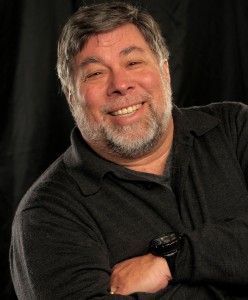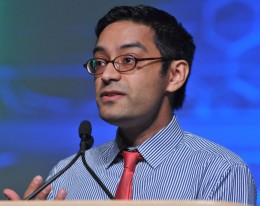
Apple cofounder Steve Wozniak will speak at the Wright State Nutter Center on Feb. 4 as part of the Honors Institute and the Presidential Lecture Series.
Apple cofounder Steve Wozniak and New York Times tech reporter Farhad Manjoo will discuss developments in computing and technology during Wright State University’s Honors Institute.
Wozniak, who founded Apple Computer with Steve Jobs, will speak in the Wright State Nutter Center arena on Wednesday, Feb. 4, at 7 p.m.
His talk is part of both the Honors Institute and the Presidential Lecture Series. Wozniak’s lecture is free and registration is not required.
Manjoo, the New York Times “State of the Art” columnist, will give the Honors Institute’s luncheon address on Tuesday, Feb. 10, at 12:30 p.m. in the Apollo Room in the Student Union.
The luncheon is free and open to the public, but advanced registration is required. Register on the Honors Institute’s website.
The theme of this year’s Honors Institute is “The Digital Revolution.”

New York Times technology reporter Farhad Manjoo will give the Honors Institute’s luncheon address on Feb. 10 in the Apollo Room in the Student Union.
“The digital revolution is a revolution that affects each of us every day, in every area of our life, from education to banking to shopping. Every way that we can think of we’ve been affected by the digital revolution,” said Susan Carrafiello, director of the University Honors Program.
Wozniak, a Silicon Valley icon and philanthropist, has helped shape the computing industry with his design of Apple’s first line of products, the Apple I and II, and influenced the popular Macintosh.
“He’s one of the readily recognizable figures that the man on the street might be familiar with simply because they might be holding an iPhone,” Carrafiello said. “That in a sense is a consequence of the beginnings of Apple that he helped cofound.”
In 1976, Wozniak and Steve Jobs founded Apple Computer Inc. with Wozniak’s Apple I personal computer. The following year, he introduced his Apple II personal computer, featuring a central processing unit, a keyboard, color graphics and a floppy disk drive. The Apple II was integral in launching the personal computer industry.
In 1981, Wozniak returned to the University of California Berkeley to finish his degree in electrical engineering and computer science.
Wozniak received the National Medal of Technology, the highest honor bestowed on America’s leading innovators, for his achievements at Apple, in 1985.
In 2000, he was inducted into the Inventors Hall of Fame and received the prestigious Heinz Award for Technology, the Economy and Employment for designing the first personal computer and for redirecting his passion for mathematics and electronics toward education.
Wozniak has been involved in numerous business and philanthropic ventures, focusing primarily on computer capabilities in schools, stressing hands-on learning and encouraging creativity in students. He adopted the Los Gatos Union School District in California, working with students and teachers and donating state-of-the-art technology equipment.
He founded the Electronic Frontier Foundation and was the founding sponsor of the Tech Museum, Silicon Valley Ballet and Children’s Discovery Museum of San Jose.
In 2014, he received the Hoover Medal, a prestigious honor given for “outstanding extra-career services by engineers to humanity.”
Wozniak served as chief scientist at Fusion-io, a data storage and server company, and currently holds the same title at Primary Data, a data virtualization company.
In 2006, he published his New York Times best-selling autobiography, “iWoz: From Computer Geek to Cult Icon.” He has appeared on several television shows including “Dancing with the Stars” and “The Big Bang Theory.”
Manjoo joined the New York Times as its “State of the Art” columnist in February 2014. Before that, he was a technology columnist at The Wall Street Journal.
Previously, he was a technology columnist at Slate magazine and was a contributing writer at Fast Company. He has also written for Wired News and Salon.com and has been a contributor at National Public Radio.
He is the author of “True Enough: Learning to Live in a Post-Fact Society,” which was published in 2008.
Carrafiello described Manjoo as a “living example of someone who has been impacted by the digital revolution that people such as Steve Wozniak helped to create.”
“He is one of the next generation fulfilling the promises of that change in the way that we receive and send and share information,” she said.
Manjoo’s participation in the 2015 Honors Institute Symposium is courtesy of The New York Times inEducation program and Wright State’s First Year Programs in University College.
Now in its 10th year, the Honors Institute is no stranger to big speakers. In recent years, the institute has sponsored talks by Neil deGrasse Tyson, the director of the Hayden Planetarium at the American Museum of Natural History; physicist and author Michio Kaku; and deep-sea explorer Robert Ballard, who discovered the sunken Titanic.
More information on the Honors Institute is available at wright.edu/honors/honors-institute.

 Wright State alum Lindsay Aitchison fulfills childhood space-agency dream
Wright State alum Lindsay Aitchison fulfills childhood space-agency dream  Wright State business professor, alumnus honored by regional technology organizations
Wright State business professor, alumnus honored by regional technology organizations  Wright State University Foundation awards 11 Students First Fund projects
Wright State University Foundation awards 11 Students First Fund projects  Gov. DeWine reappoints Board Treasurer Beth Ferris and names student Ella Vaught to Wright State Board of Trustees
Gov. DeWine reappoints Board Treasurer Beth Ferris and names student Ella Vaught to Wright State Board of Trustees  Joe Gruenberg’s 40-Year support for Wright State celebrated with Honorary Alumnus Award
Joe Gruenberg’s 40-Year support for Wright State celebrated with Honorary Alumnus Award 